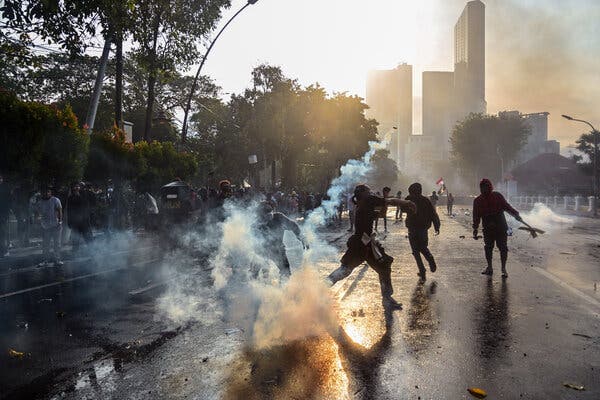Protests in Indonesia Lead to Three Deaths and Nationwide Unrest

Three individuals lost their lives in Indonesia on Friday as protests against President Prabowo Subianto escalated beyond the capital, Jakarta. The victims, government workers, perished after attempting to flee a building set ablaze by demonstrators. According to M. Fadli Tahar, the acting head of the Makassar Regional Disaster Management Agency, the victims jumped from the third floor of the burning structure.
The protests, which originated in Jakarta earlier in the week, have rapidly spread to several cities, marking a significant challenge for President Prabowo, who assumed office in October 2023. Reports indicate that dozens of vehicles, including cars and motorcycles, were damaged amid the unrest. Visuals shared on social media by the All-Indonesia Students’ Union, the group organizing the protests, showcased the destruction, including buses and motorcycles set alight.
As tensions escalated, authorities have yet to confirm if additional protests will occur on Saturday. The unrest has been fueled by discontent over government policies, particularly regarding housing allowances for lawmakers, which protesters deem excessive in light of the country’s economic difficulties. The International Monetary Fund has warned of rising consumer prices and a potential increase in the unemployment rate, exacerbating public frustration.
The protests took a violent turn when a police vehicle attempted to disperse demonstrators on Thursday night, resulting in one fatality that has prompted an investigation. President Prabowo visited the family of the deceased on Friday, amid rising concerns over police brutality and its implications for democracy and civil rights in Indonesia.
Many citizens are apprehensive that the current administration may echo the authoritarian rule of former president Suharto, under whom President Prabowo was implicated in the abduction and torture of pro-democracy activists. This historical context intensifies fears about the potential erosion of civil liberties.
By Friday, protests had erupted in at least six cities, with some instances turning violent. In Jakarta, riot police deployed tear gas, and troops from the navy’s marine corps were called in to maintain order as the situation unfolded. The ongoing unrest reflects widespread dissatisfaction and poses an urgent test for President Prabowo’s leadership in a nation of approximately 284 million people.






